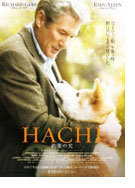

Opening 12 Nov 2009
Directed by:
Lasse Hallström
Writing credits:
Stephen P. Lindsey, Kaneto Shindô
Principal actors:
Richard Gere, Sarah Roemer, Joan Allen, Jason Alexander, Cary-Hiroyuki Tagawa
One night, when professor Parker Wilson (Richard Gere) returns from work, he finds a cute puppy lost at the railway station. His wife Cate (Joan Allen) reluctantly accepts the helpless little creature into the household. The name tag on his collar says HACHIKO and Parker’s Japanese friend Ken (Cary-Hiroyuki Tagawa) explains “hachi” means the number eight, symbolising good luck. Hachiko is happily growing up in the family but only bonding with the professor, accompanying him on his daily routine to the train station in the morning and faithfully waiting for him in the evenings. When Parker collapses during a lecture and does not return, Hachiko waits in vain. He misses his master and returns to the train station every day. Come rain or shine – he sits waiting on his usual spot. Commuters come and go. They greet him, give him food, talk to him and all are touched by his loyalty.
Director Lasse Hallström based his film on the 1987 Japanese blockbuster Hachiko Monogatari but moved the scene of the American adaptation to Rhode Island. Unfortunately, this remake leaves us with a few loose ends (why does Cate not want the dog in the house, what happened to Luke?). There is not much of a plot – in fact, there is no plot – but it will touch you just the same. The young dog is adorable, and as he grows older he looks at you with convincingly sad eyes. If you are a dog lover, you will enjoy this film. Bring your children too, and don’t forget the tissues.
P.S. The true story took place in Tokyo back in 1924 and is a famous Japanese tale of an Akita dog belonging to professor Uyeno. At the end of the day, the dog greeted his master near the Shibuya station. When Uyeno suffered a stroke and did not return, his dog Hachiko continued to come to the station for the next ten years, waiting in vigil for his dead master. He became a national sensation and eventually Tokyo’s largest newspaper reported about his remarkable loyalty. In 1934 a bronze statue was erected outside Tokyo’s Shibuya station as a permanent reminder of his devotion. He died one year later. (Birgit Schrumpf)